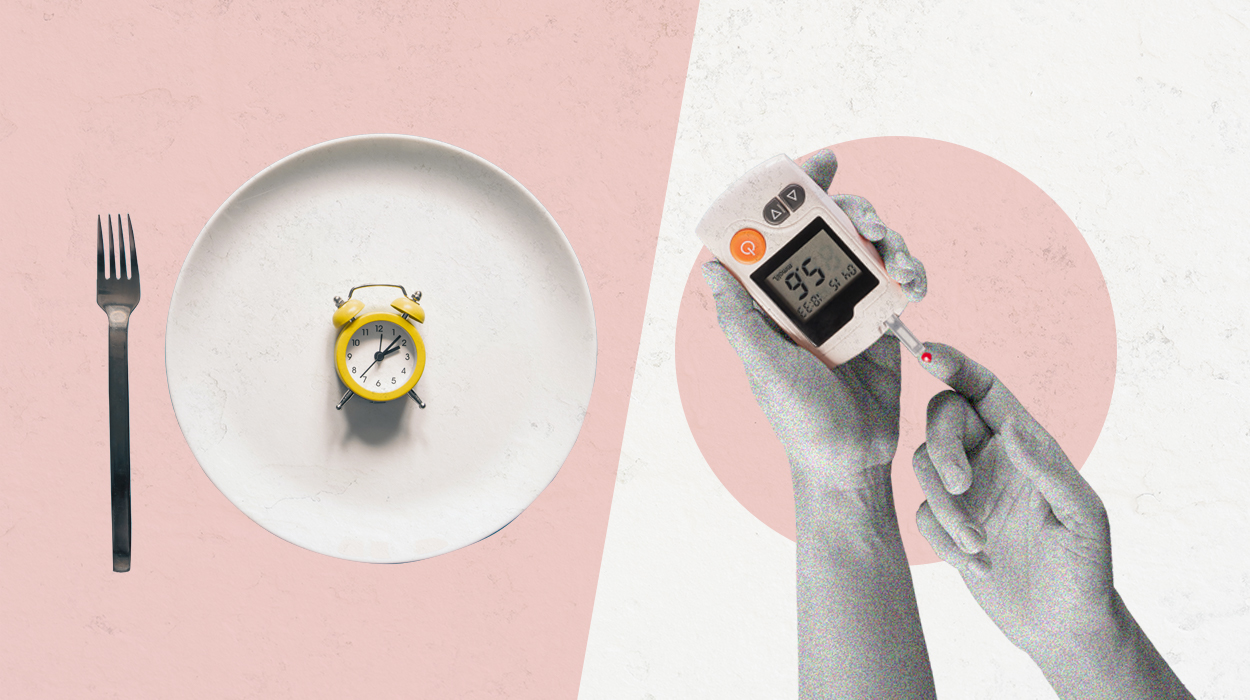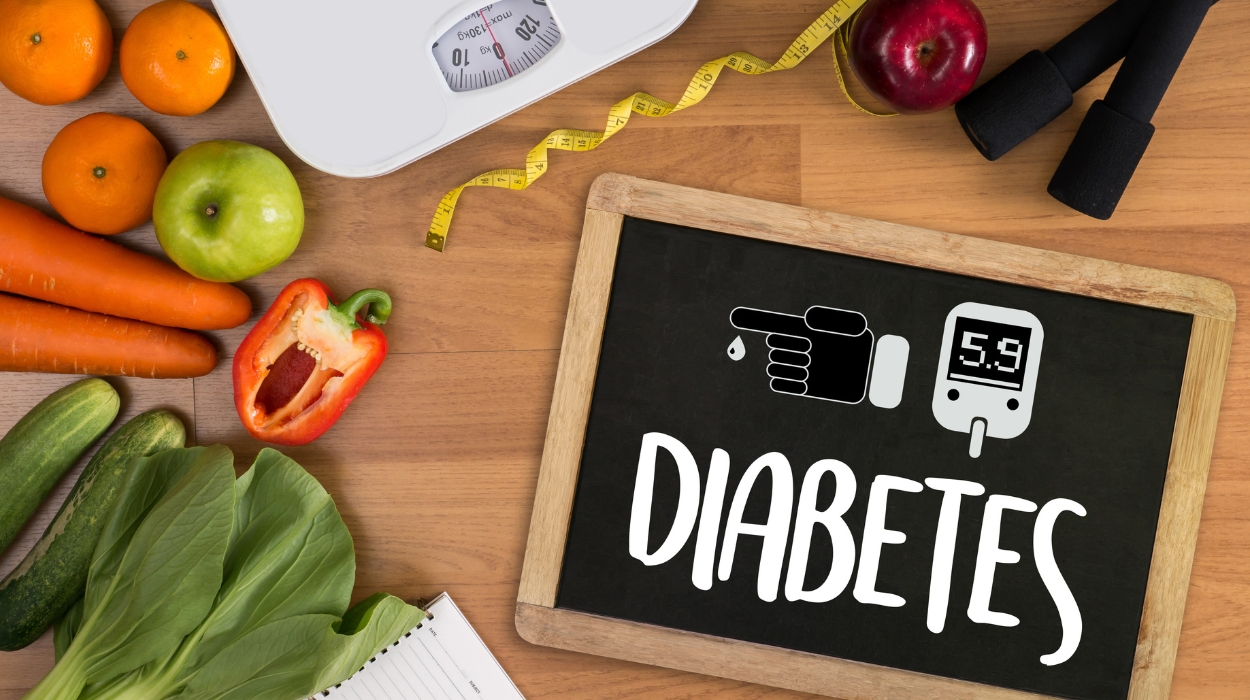 Expert's opinion
Expert's opinion
Expert's opinion
The article is a subjective view on this topic written by writers specializing in medical writing.
It may reflect on a personal journey surrounding struggles with an illness or medical condition, involve product comparisons, diet considerations, or other health-related opinions.
Although the view is entirely that of the writer, it is based on academic experiences and scientific research they have conducted; it is fact-checked by a team of degreed medical experts, and validated by sources attached to the article.
The numbers in parenthesis (1,2,3) will take you to clickable links to related scientific papers.
Intermittent Fasting For Diabetes: Is It Good? & Tips You Should Know In 2024

When you have type 1 diabetes, type 2 diabetes, or are at risk for diabetes, one of the best ways to prevent potential complications is through weight loss[1]. This can be achieved through exercise, diet, or a combination of both. Intermittent fasting is often incorporated into popular diets as a method for consuming fewer calories and achieving weight loss.
Losing weight has significant health benefits for individuals with diabetes, surpassing the benefits of diabetes medication[2]. Even modest weight loss can improve insulin sensitivity and reduce blood glucose levels.
Is it safe to use intermittent fasting to lose weight when you have diabetes? In this article, we will discuss the risks and benefits of intermittent fasting when also managing diabetes and provide you with the best scientific tips to support you on your journey.
Intermittent Fasting For Diabetics Is Good Or Bad?
Intermittent fasting with diabetes management might seem complicated. Therefore, monitoring and managing glucose and insulin levels at all times is crucial.
Here are some benefits of intermittent fasting for diabetics:
- Improved Insulin Sensitivity
- Weight Management
- Potential Cardiovascular Benefits
Besides that, some risks of intermittent fasting for diabetics, you should notice:
- Hypoglycemia Risk
- Medication Adjustments
- Adherence Challenges
Benefits Of Intermittent Fasting For Diabetes
Improved Insulin Sensitivity
Glycemic control is very important in diabetes[2]. In as little as 8 weeks, sugar levels can decrease by 6.8% using Alternate Day Fasting. Various studies show benefits for intermittent fasting diets with up to a 25% reduction in glucose levels. This translates to better HbA1c levels and decreased insulin resistance too.
The timing of feeding windows is important too. Late afternoon or evening feeding times were worse than earlier windows for controlling high blood sugar. This suggests morning and lunchtime eating schedules are preferred.
When used regularly, diet and exercise may be enough to cause diabetes remission and reverse insulin resistance.
Weight Management
In a review of various studies[2] for different types of intermittent fasting, the time-restricted feeding plan did not help as much as the other intermittent fasting plans for weight loss. The authors suggest that this is because the body starts burning stored fat starting between 12 and 36 hours into the fasting state. Eating patterns with longer fasting times will burn more body fat to maintain fasting blood sugar levels.
The same review article on intermittent fasting provided examples of weight loss for the Modified Alternate Day Fasting over time; losses of 5.8% by 8 weeks, 6.5% by 12 weeks, and 7.8% by 6 months, respectively.
Research suggests that a fasting regimen can be better than a diet of calorie restriction. Both can reduce body weight, but intermittent fasting would, specifically, burn more body fat and are less likely to lower metabolism which would cause a rebound weight gain.
Potential Cardiovascular Benefits
Losing weight and improving your diet can help prevent cardiovascular disease[3]. Intermittent fasting can lower bad cholesterol and raise good cholesterol. Blood pressure is also lowered to further help prevent heart disease.
What Is Intermittent Fasting?
Fasting is a time when you do not eat anything. We naturally fast when we are sleeping. Intermittent fasting in a dietary plan involves extending the period that you go without eating. The diet focuses more on when you eat, rather than what you eat. For example, you might restrict your eating from noon to 8 pm every day, allowing an eight-hour window for consuming your daily calories while fasting for the remainder of the day.
Different diets employ various fasting schedules and time windows. Here are a few common schedules in the studies we have reviewed:
- Time-restricted Feeding: fast for 12 to 20 hours every day and use a feeding window for 4 to 12 hours.
- Alternate Day Fasting: one day with no dietary restrictions and one day of complete fasting.
- Modified Alternate Day Fasting: one day with no restrictions and one day with a limited calorie intake.
- The 5:2 diet: five days with no restrictions and two days of fasting.
- The 6:1 diet: six days with no restrictions and one day of fasting.
These periodic fasting schedules should be customized according to individual preferences and may be modified as desired.
How Does Intermittent Fasting Work For Diabetics?

How to stay safe using an intermittent fasting diet with diabetes.
Intermittent fasting with diabetes management might seem complicated, so it helps to understand what happens to glucose and insulin when you eat and when you fast. In diabetes, the body does not produce enough insulin or cannot use it well. The body uses insulin to help manage the amount of sugar in your bloodstream. Insulin transfers glucose from the blood to the cells. Without insulin, too much blood sugar can cause health problems.
When you eat, the proteins, fats, and sugars in food enter the body and are changed to a sugar called glucose. The body uses glucose for energy. Insulin is the body’s natural blood sugar control hormone telling the glucose what to do. Glucose levels can become too high when insulin isn’t working properly.
During fasting, the body still requires a source of energy and can use stored fat[4] to maintain fasting blood glucose levels. Therefore, monitoring and managing glucose and insulin levels at all times is crucial.
Risk Of Intermittent Fasting For Diabetes
Hypoglycemia Risk
The biggest risk[2] when people with diabetes start a diet is having their blood sugar go too low. You consume fewer calories and have less glucose after eating. Gradually, you increase insulin sensitivity and current treatments may become too strong and you will need a proper diabetes medication adjustment.
It is important to keep a regular schedule and not eat at unusual times. For example, studies of diabetics practicing religious fasting during Ramadan[5] where they would only eat when the sun is down had an increased risk of low blood sugar and needing hospitalization.
Medication Adjustments
Many diabetes medications[6] and doses are based on when and how much you eat. Some people use insulin with a sliding scale based on how many carbs they are going to eat and how much insulin they require. Other medicines, such as glipizide, are taken with the first bite of food to prevent high blood sugar levels after eating.
Talk to your prescriber or pharmacist when starting or stopping a diet to know which medication doses need to be adjusted. Continuous blood glucose monitoring is ideal during these times. Test as often as you can to help identify problems before they become symptomatic.
Adherence Challenges
Maintaining a consistent fasting period and eating window is not easy. Along with changing exercise habits and caloric intake on top of managing chronic diseases such as diabetes can be overwhelming. You must plan your eating schedule ahead of time and be prepared if something goes off plan and requires a medication adjustment to compensate.
Tips For Intermittent Fasting When You Have Diabetes
Choosing the best foods and supplements can help you go further.
- Consult a medical professional to help make plans to start any diet change. Prescribers can help adjust your medicines and tell you the risks with them. Nutritionists or dieticians can help you make decisions for your intermittent fasting plan.
- Get inspired to make healthy decisions. You can eat anything within your window and it is a good idea to prepare some healthy snacks for people with diabetes.
- Make changes gradually. Small and short-term goals can make a big difference. Take it one step at a time and add more as you get more confident with your plan.
- Monitor blood sugar levels regularly. It is very important with periodic fasting to learn the relationship between your eating habits and sugar levels.
- Intermittent fasting combined with reduced calorie intake can be better than fasting alone but make certain you are meeting your nutritional requirements of vitamins and minerals. Diabetes superfoods are excellent choices to meet your daily needs and may help further lower blood sugar levels.
- A fasting-mimicking diet day with low-calorie but highly nutritional vegetables can be just as effective as a normal fast day with no eating.
- CBD oils for diabetes have recently been suggested for lowering blood sugar but the research doesn’t support it yet. Fish oil to help manage cholesterol is well documented as beneficial. Do your research and check with your pharmacist to see if you have any drug interactions before starting any new supplements.
Is Intermittent Fasting Safe For People With Diabetes?
Eating and fasting require diligent monitoring of glucose.
The benefits of fasting versus a normal calorie-restricted diet to help treat diabetes are clear. Fasting can enhance insulin sensitivity for blood glucose control and reduce cholesterol and blood pressure, therefore reducing the risk of heart disease and helping control weight.
Depending on your current diabetes care plan you will need to make adjustments. There is a risk of hypoglycemia so you must be diligent with monitoring. Your insulin requirements might be reduced too.
Conclusion
In conclusion, Intermittent fasting can be a safe and effective weight loss strategy for people with diabetes. It is superior to diets that impose calorie restrictions in terms of lowering glucose and improving insulin sensitivity. You are less likely to regain the weight too.
Careful monitoring and professional guidance with medications are crucial. A plan for a balanced and nutrient-rich diet is important to meet your basic nutritional needs. Be prepared to manage low or high blood sugar readings. A personalized approach is essential to success.
+ 6 sources
Health Canal avoids using tertiary references. We have strict sourcing guidelines and rely on peer-reviewed studies, academic researches from medical associations and institutions. To ensure the accuracy of articles in Health Canal, you can read more about the editorial process here
- David C.W. Lau and Teoh, H. (2013). Benefits of Modest Weight Loss on the Management of Type 2 Diabetes Mellitus. [online] 37(2), pp.128–134. doi:https://doi.org/10.1016/j.jcjd.2013.03.023.
- Zubrzycki, A., Katarzyna Cierpka-Kmiec, Zbigniew Kmieć and Aleksandra Wrońska (2018). The role of low-calorie diets and intermittent fasting in the treatment of obesity and type-2 diabetes. [online] 69(5). doi:https://doi.org/10.26402/jpp.2018.5.02.
- Malinowski, B., Klaudia Zalewska, Węsierska, A., Sokołowska, M., Socha, M.W., Grzegorz Liczner, Katarzyna Pawlak-Osińska and Michał Wiciński (2019). Intermittent Fasting in Cardiovascular Disorders—An Overview. [online] 11(3), pp.673–673. doi:https://doi.org/10.3390/nu11030673.
- Rui, L. (2014). Energy Metabolism in the Liver. [online] pp.177–197. doi:https://doi.org/10.1002/cphy.c130024.
- Tootee, A. and Bagher Larijan (2021). Ramadan fasting and diabetes, latest evidence and technological advancements: 2021 update. [online] 20(1), pp.1085–1091. doi:https://doi.org/10.1007/s40200-021-00806-2.
- Silbert, R., Salcido-Montenegro, A., Rodriguez-Gutierrez, R., Abdulrahman Katabi and McCoy, R.G. (2018). Hypoglycemia Among Patients with Type 2 Diabetes: Epidemiology, Risk Factors, and Prevention Strategies. [online] 18(8). doi:https://doi.org/10.1007/s11892-018-1018-0.



